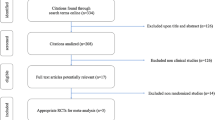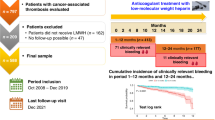Summary
It has been shown that several different low molecular weight (LMW) heparins, given by a once- or twice-daily subcutaneous injection without laboratory monitoring, are as effective or even more effective than continuous intravenous, unfractionated heparin monitored by the activated partial thromboplastin time (APTT). One such study demonstrated a statistically significant decrease in mortality over the 3 month follow-up study. This was particularly striking in patients with cancer. Based on these findings, a multicentre, randomized clinical trial has been designed to compare the effect of long-term, once-daily LMW heparin with standard treatment using heparin and warfarin to ensure that equal numbers of cancer patients are in both groups. This will demonstrate whether or not the long-term use of LMW heparin can have a significant impact on mortality in patients who have proximal venous thrombosis with or without cancer.
Similar content being viewed by others
Author information
Authors and Affiliations
Rights and permissions
About this article
Cite this article
Hull, R., Pineo, G. & Brant, R. A randomized trial of the effect of low molecular weight heparin vs. warfarin on mortality in the long-term treatment of proximal vein thrombosis. Intensivmed 37 (Suppl 1), S123–S132 (2000). https://doi.org/10.1007/s003900070014
Issue Date:
DOI: https://doi.org/10.1007/s003900070014




